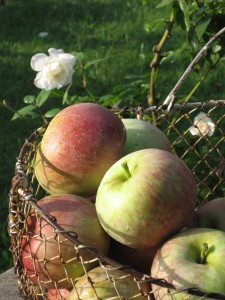Fab Fuji Apples
 I have two espaliered* Fuji Apple trees along one side of my potager*. Although I have cared for them diligently for years, feeding annually in the Spring, pruning faithfully in Winter, watering, and observing them as I walk past them everyday (often several times a day), they always limped along for me. The apples were small, sparse, and unappealing. I always attributed it to our zone 11. Fuji Apple trees do best in zones 6-9, 14-16, and 18-22. Nonetheless, I love my espaliered Fuji Apple trees.
I have two espaliered* Fuji Apple trees along one side of my potager*. Although I have cared for them diligently for years, feeding annually in the Spring, pruning faithfully in Winter, watering, and observing them as I walk past them everyday (often several times a day), they always limped along for me. The apples were small, sparse, and unappealing. I always attributed it to our zone 11. Fuji Apple trees do best in zones 6-9, 14-16, and 18-22. Nonetheless, I love my espaliered Fuji Apple trees.
Something happened this year that I am still trying to figure out. This year I have an abundance of beautiful large sweet Fuji Apples! I understand now their popularity. You will truly experience one of life's little pleasures simply by eating a ripe Fuji Apple fresh off the tree.
Created in Japan in the 1930's, the Fuji Apple comes from American beginnings, a combination of the Red Delicious and Ralls Genet, an heirloom apple that dates back to Thomas Jefferson, 1793. Fuji Apples were first introduced into the United States in the 1960's. They are a late season apple, harvested in late September and October. They are distinctive in appearance with a yellow-green background color and red highlights. Excellent for eating fresh, and in autumn salads, they are also good to use in pies and sauce. Fuji Apples have a very firm, crisp flesh, and are very sweet and juicy to the taste. They store exceptionally well.
Putting on my detective hat, and delving into the habits of Fuji Apples trees, I have since learned that it can take several years for them to get established and bear reasonable fruit, they have a tendency to bear heavy crops in alternate years, and it is best to plant another Fuji Apple tree within 20 feet of each other, or another mid to late-blooming apple tree for pollination. They do best in zones with a mild winter, and have a long growing season with apples that take 160 days to ripen. Their fruit needs 100 to 400 winter chill* hours to establish dormancy. So it seems there are a number of factors that can affect Fuji Apple fruit from year to year.
Every year there is at least one thing in the garden that really surprises me. This year it is the fabulous Fuji Apples. With these "just picked" Fuji Apples, I am going to make my "Apple Crumb Pie", see recipes.
Glossary
-
*Espalier--French term for training a tree or plant to grow in a specific shape or form, usually on a flat surface such as a wall or a building. The shape is often architecturally appealing and space saving.
*Potager--French term for kitchen garden which is usually gardened year-round, and is often laid out in a formal and ornamental style.
*Winter Chill--As it pertains to apple trees, is the number of hours in a climate zone where temperatures are at or below 45 degrees F, 7 degrees C.
